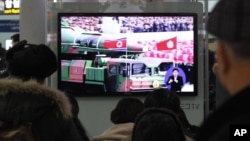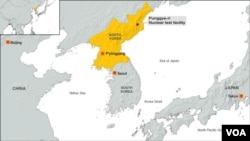North Korea's latest threat to conduct its third nuclear test and launch more long-range rockets is not just bluster but part of a deliberate effort by an increasingly confident Pyongyang to build up its atomic weapons capacity, analysts say.
The National Defense Commission, the North's highest military body, said Thursday the planned moves include a series of satellite and long-range rocket launches as well as a nuclear test "of a higher level" targeting what it called its "arch enemy," the United States.
It sharply rejected Tuesday's unanimous censure by the United Nations Security Council of North Korea's December 12 rocket launch as a violation of existing U.N. sanctions.
White House spokesman Jay Carney condemned Pyongyang's announcement as "needlessly provocative" and said any further actions by North Korea would violate U.N. resolutions and increase the country's diplomatic isolation.
Deliberate effort
But according to former U.S. State Department official Mitchell Reiss, Washington should expect the North's new, untested leader, Kim Jong Un, to carry out the threats, which pose huge challenges not only for the United States, but his last remaining major ally, China.
"Over the past few decades, there has been a very deliberate, methodical march by the North to develop, and eventually refine and perfect both its ballistic missiles and its nuclear capability. So [a third nuclear test] is not a question of if, but when," said Reiss, who has years of private and public sector experience negotiating with the North Koreans.
He said the purpose of an eventual third test would likely be to develop "a warhead small enough to be placed on a ballistic missile that could be delivered at long range."
Recent satellite photos suggest North Korea has been preparing for a nuclear test, at the same Punggye-ri site where it conducted its previous tests in 2006 and 2009.
"The preparations have been under way, so it's pretty clear that regardless of what the Security Council did, they were going to be deeply offended and decide on their test," said Ralph Cossa of the Hawaii-based Pacific Forum.
South Korea's Defense Ministry Thursday said the facility could be ready to conduct a test at any time, if Kim decides to do so.
Minutes before the latest threat, the U.S. special envoy on North Korea, Glyn Davies, told reporters in Seoul that North Korea should not carry out the test.
Chinese wildcard
A number of factors could influence when North Korea actually moves ahead with its plans, among them hard-to-define internal issues within the reclusive dictatorship as well as the behavior of South Korea and China.
Reiss, who said Pyongyang's behavior is antagonizing Beijing, described China's endorsement of this week's United Nations resolution as part of an "increasing reassessment" by intellectuals, academics and the Chinese Communist Party "about the value and wisdom of keeping North Korea as the type of ally [it has been]."
He said the Chinese have "significant influence" over North Korea both as an energy/food supplier and a "safety valve" source of temporary employment for North Korean workers.
On Thursday, the North denounced the Chinese and Russian moves to join the U.N.'s condemnation of its December rocket launch.
Some experts speculate Pyongyang's reference to an enhanced nuclear test means the North may now be capable of testing a weapon made from highly enriched uranium, rather than the plutonium devices used in the two previous tests. In 2010, North Korea revealed a laboratory used for attempts to enrich uranium.
The successful December missile launch in harsh winter conditions was a boon to Kim and likely boosted North Korea's confidence, said Reiss, who pointed to marked advances in the North's nuclear program with assistance from outside actors, including Iran.
He declined to speculate on exactly when the next nuclear test may take place other than to say "no one but the North Koreans know what the timing will be."
The National Defense Commission, the North's highest military body, said Thursday the planned moves include a series of satellite and long-range rocket launches as well as a nuclear test "of a higher level" targeting what it called its "arch enemy," the United States.
It sharply rejected Tuesday's unanimous censure by the United Nations Security Council of North Korea's December 12 rocket launch as a violation of existing U.N. sanctions.
White House spokesman Jay Carney condemned Pyongyang's announcement as "needlessly provocative" and said any further actions by North Korea would violate U.N. resolutions and increase the country's diplomatic isolation.
Deliberate effort
But according to former U.S. State Department official Mitchell Reiss, Washington should expect the North's new, untested leader, Kim Jong Un, to carry out the threats, which pose huge challenges not only for the United States, but his last remaining major ally, China.
"Over the past few decades, there has been a very deliberate, methodical march by the North to develop, and eventually refine and perfect both its ballistic missiles and its nuclear capability. So [a third nuclear test] is not a question of if, but when," said Reiss, who has years of private and public sector experience negotiating with the North Koreans.
He said the purpose of an eventual third test would likely be to develop "a warhead small enough to be placed on a ballistic missile that could be delivered at long range."
Recent satellite photos suggest North Korea has been preparing for a nuclear test, at the same Punggye-ri site where it conducted its previous tests in 2006 and 2009.
"The preparations have been under way, so it's pretty clear that regardless of what the Security Council did, they were going to be deeply offended and decide on their test," said Ralph Cossa of the Hawaii-based Pacific Forum.
South Korea's Defense Ministry Thursday said the facility could be ready to conduct a test at any time, if Kim decides to do so.
Minutes before the latest threat, the U.S. special envoy on North Korea, Glyn Davies, told reporters in Seoul that North Korea should not carry out the test.
Chinese wildcard
A number of factors could influence when North Korea actually moves ahead with its plans, among them hard-to-define internal issues within the reclusive dictatorship as well as the behavior of South Korea and China.
Reiss, who said Pyongyang's behavior is antagonizing Beijing, described China's endorsement of this week's United Nations resolution as part of an "increasing reassessment" by intellectuals, academics and the Chinese Communist Party "about the value and wisdom of keeping North Korea as the type of ally [it has been]."
He said the Chinese have "significant influence" over North Korea both as an energy/food supplier and a "safety valve" source of temporary employment for North Korean workers.
On Thursday, the North denounced the Chinese and Russian moves to join the U.N.'s condemnation of its December rocket launch.
Some experts speculate Pyongyang's reference to an enhanced nuclear test means the North may now be capable of testing a weapon made from highly enriched uranium, rather than the plutonium devices used in the two previous tests. In 2010, North Korea revealed a laboratory used for attempts to enrich uranium.
The successful December missile launch in harsh winter conditions was a boon to Kim and likely boosted North Korea's confidence, said Reiss, who pointed to marked advances in the North's nuclear program with assistance from outside actors, including Iran.
He declined to speculate on exactly when the next nuclear test may take place other than to say "no one but the North Koreans know what the timing will be."












